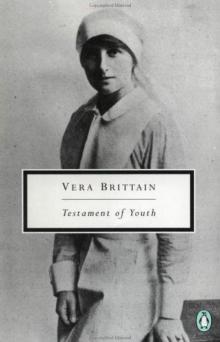Testament of Youth: An Autobiographical Study of the Years 1900-1925 

Genre: Other8
Published: 2009
View: 4764
Read OnlineRead Testament of Youth: An Autobiographical Study of the Years 1900-1925 Storyline:
In 1914 Vera Brittain was twenty, and as war was declared she was preparing to study at Oxford. Four years later her life - and the life of her whole generation - had changed in a way that would have been unimaginable in the tranquil pre-war era.TESTAMENT OF YOUTH, one of the most famous autobiographies of the First World War, is Brittain's account of how she survived those agonising years; how she lost the man she loved; how she nursed the wounded and how she emerged into an altered world. A passionate record of a lost generation, it made Vera Brittain one of the best loved writers of her time, and has lost none of its power to shock, move and enthral readers since its first publication in 1933.Amazon.com ReviewWhen war broke out in August 1914, 21-year-old Vera Brittain was planning on enrolling at Somerville College, Oxford. Her father told her she wouldn't be able to go: "In a few months' time we should probably all find ourselves in the Workhouse!" he opined. Brittain had hoped to escape the Northern provinces, but the war seemingly dashed her plans. "It is not, perhaps, so very surprising that the War at first seemed to me an infuriating personal interruption rather than a world-wide catastrophe." Her father eventually relented, however, and she was allowed to attend. By the end of her first year, she had fallen in love with a young soldier and resolved to become active in the war effort by volunteering as a nurse--turning her back on what she called her "provincial young-ladyhood." Brittain suffered through 12-hour days by reminding herself that nothing she endured was worse than what her fiancé, Roland, experienced in the trenches. Roland was expected home on leave for Christmas 1915; on December 26, Brittain received news that he had been killed at the front. Ten months later Brittain herself was sent to Malta and then to France to serve in the hospitals nearer the front, where she witnessed firsthand the horrors of battle. When peace finally came, Brittain had also lost her brother Edward and two close friends. As she walked the streets of London on November 11, 1918--Armistice Day--she felt alone in the crowds:For the first time I realised, with all that full realisation meant, how completely everything that had hitherto made up my life had vanished with Edward and Roland, with Victor and Geoffrey. The War was over; a new age was beginning; but the dead were dead and would never return. First published in 1933, Testament of Youth established Brittain as one of the best-loved authors of her time. Her crisp, clear prose and searing honesty make this unsentimental memoir of a generation scarred by war a classic. --Sunny DelaneyReviewIt would seem enough that Vera Brittain's autobiography is an honestly gut-wrenching love story, a haunting account of her romance with a brilliant young soldier who died at the front in World War I. Testament of Youth is her tribute to her beloved warrior, but it is also an insightful and beautifully written record of her world before, during, and after the war. As the book begins, Vera Brittain is a young woman determined to free herself from the constraints placed upon females in England. She longs for "a more eventful existence and a less restricted horizon." Ironically, soon after her hard-won acceptance at mostly-male Oxford, war begins, and the repressive English society is altered at its core. While the war cruelly robs Vera Brittain of her lover, her brother, her dearest friends, and her academic work, it also opens a new world for her, allowing her to leave her previously cloistered and chaperoned female enclave and to go alone to various foreign fronts as a nurse for wounded soldiers. She is a shrewd and intelligent observer of all aspects of the war, and her liberal use of passages from letters, diaries, and the poetry of her wartime contemporaries gives her story a directness and an emotional impact which obliterates the decades between then and now. In the end, this is a testament to a fiercely independent spirit and a strong, wise feminist who was not afraid. -- For great reviews of books for girls, check out Let's Hear It for the Girls: 375 Great Books for Readers 2-14. -- From 500 Great Books by Women; review by Rebecca SullivanPages of Testament of Youth: An Autobiographical Study of the Years 1900-1925 :